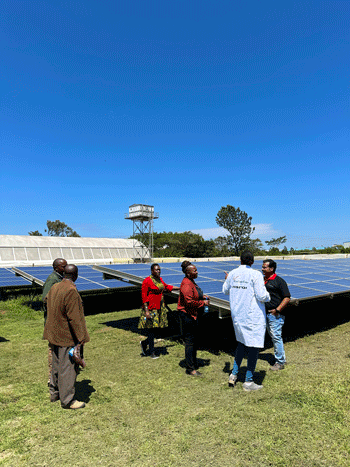
Redlands Roses: The Path to Sustainable Flower Farming with Conservation at Its Core
The environment is fundamental to the survival of humans and all living creatures. In flower farming, responsible practices are key to nurturing these blooms that bring so much joy. Today, growers aren’t just discussing environmental initiatives—they’re actively conserving water, protecting soil health, and preserving ecosystems. At Redlands Roses, a leading floriculture business, sustainability is at the heart of operations. Founded in 1996 by Dr. Isabelle and Aldric Spindler, Redlands Roses has made environmental stewardship a priority, a legacy now championed by CEO Disha Copreaux.
For Kenyan farms, sharing the story of sustainable growing practices is essential. “We’re not just ‘cowboys’ doing as we please,” said Copreaux. “It’s frustrating to read one-sided narratives that overlook our sustainability efforts. As a proud Kenyan managing a farm, I want to shift that perception and highlight that we and other Kenyan growers have been environmentally conscious from the start.”
Sustainable Land Use and Water Conservation
Redlands Roses is located on non-arable land, so it doesn’t compete with food agriculture. The farm’s red-soil grounds use a hydroponic system to prevent nitrogen runoff into rivers and waterways. By recycling water, the farm conserves one of its most precious resources. All rainwater collected through gutters is directed to reservoirs on the farm.
“Initially, with a farm of 28 hectares, we had two reservoirs. Now, as we’ve expanded to 43 hectares, we’ve added three more, including a large 20,000-cubic-meter reservoir we call the ‘Chinese Lake.’ This allows us to reduce reliance on natural water sources and conserve rainwater instead,” Copreaux explained. “Any water that’s too dirty to reuse, like the runoff from washing our packing hall floors or sprayers’ suits, goes through a four-stage purification process in our wetland before being released back into the environment.”
Solar Energy
Redlands has also installed solar panels that meet 20% of the farm’s electricity needs. While Kenya Power provides clean energy, frequent power outages and high costs make self-sufficiency essential. As the farm continues to grow, there are plans to expand the solar installation to maintain a 20% solar contribution.

Partnering for Climate Action
Redlands Roses collaborates with One World Carbon, a UN-certified NGO, to track and reduce its carbon footprint. One World Carbon measures the greenhouse gas emissions from the farm’s operations, including supplier deliveries, fertigation, and export logistics.
“Our work with One World Carbon, now in its fourth year, allows us to measure the carbon footprint of all our activities and track offsets. Although we currently operate with a small carbon deficit, we’re working towards neutrality. It’s a gradual process requiring ongoing commitment,” Copreaux explained.
To help offset emissions, One World Carbon has recommended investing in forestry projects. Recently, Redlands planted over a hectare of trees in partnership with the Kenya Association of Manufacturers (KAM), with plans to expand this acreage in the future.
Looking Ahead
Redlands Roses has established a strong reputation in the global market. With new rose varieties and an expanded farm, the company anticipates exponential growth while upholding its commitment to sustainable practices. “We’re proud of what we’ve accomplished and will continue pushing the boundaries of sustainable floriculture,” Copreaux concluded.


